InterGlobe Aviation Bundle
How Did InterGlobe Aviation Become India's Aviation Giant?
IndiGo, operated by InterGlobe Aviation, disrupted the Indian aviation sector with its focus on affordability and efficiency. Their success story began with a strategic decision to streamline operations using a single aircraft type, the Airbus A320 family, which enabled competitive pricing. This approach, coupled with a commitment to punctuality, allowed IndiGo to quickly dominate the domestic air travel market.
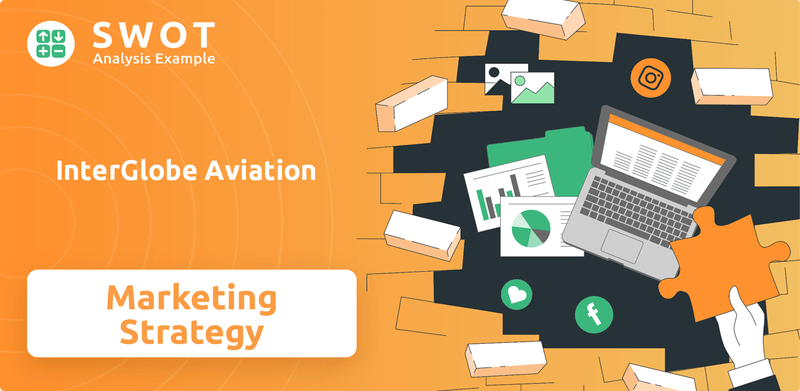
This exploration delves into the InterGlobe Aviation SWOT Analysis, examining the intricacies of its sales and marketing strategies. We'll analyze how IndiGo, also known as Indigo Airlines, has shaped its sales strategy and marketing strategy to achieve its current market position. Understanding InterGlobe Aviation's sales performance and marketing campaigns provides valuable insights into the airline industry's competitive landscape and effective marketing for budget airlines.
How Does InterGlobe Aviation Reach Its Customers?
The sales and marketing strategy of InterGlobe Aviation, operating as IndiGo, centers on a multi-channel approach designed to maximize reach and efficiency. This strategy is critical for the company's success within the competitive aviation industry. IndiGo's approach leverages both digital and offline channels to cater to a wide range of customer preferences.
A key component of IndiGo's sales strategy is its direct-to-consumer (DTC) model, primarily driven by its website and mobile app. This allows the airline to control the customer experience and reduce reliance on intermediaries. The airline also utilizes online travel agencies (OTAs) and traditional travel agents to broaden its market presence. This balanced approach helps IndiGo maintain a strong market position.
In 2024, IndiGo reported a significant increase in digital bookings, highlighting the success of its online channel strategy. The airline's focus on digital platforms, combined with strategic partnerships, underscores its commitment to adapting to evolving customer behaviors and market dynamics. For more details on the company's revenue streams and business model, see Revenue Streams & Business Model of InterGlobe Aviation.
IndiGo's website (goindigo.in) is the primary online sales channel, offering direct bookings and ancillary service purchases. The mobile app has seen increasing adoption, accounting for a substantial portion of digital bookings. These platforms allow for a direct-to-consumer (DTC) approach, contributing to cost efficiency and customer experience control.
IndiGo partners with OTAs like MakeMyTrip, Goibibo, and EaseMyTrip to expand its online reach. While this involves commission costs, it broadens the airline's market penetration. This strategy allows IndiGo to capture a wider audience and increase overall sales.
Airport ticketing counters cater to last-minute bookings and travelers preferring in-person assistance. A network of travel agents across India facilitates bookings for individuals and corporate clients. These channels, though less dominant, provide essential services and support diverse customer needs.
Codeshare agreements, such as those with Turkish Airlines, extend IndiGo's network and offer seamless connectivity. These partnerships attract international travelers and contribute to market share growth. This collaborative approach enhances the airline's global presence.
IndiGo's sales strategy focuses on a multi-channel approach, emphasizing digital platforms while maintaining a presence in offline channels. The airline's marketing strategy complements its sales efforts by building brand awareness and customer loyalty. This integrated approach supports the airline's overall growth objectives.
- Direct-to-Consumer (DTC) Sales: Primarily through website and mobile app, offering cost efficiency and control.
- Online Travel Agencies (OTAs): Expanding reach and market penetration.
- Offline Channels: Airport counters and travel agents for diverse customer needs.
- Strategic Partnerships: Codeshare agreements to expand network and attract international travelers.
InterGlobe Aviation SWOT Analysis
- Complete SWOT Breakdown
- Fully Customizable
- Editable in Excel & Word
- Professional Formatting
- Investor-Ready Format
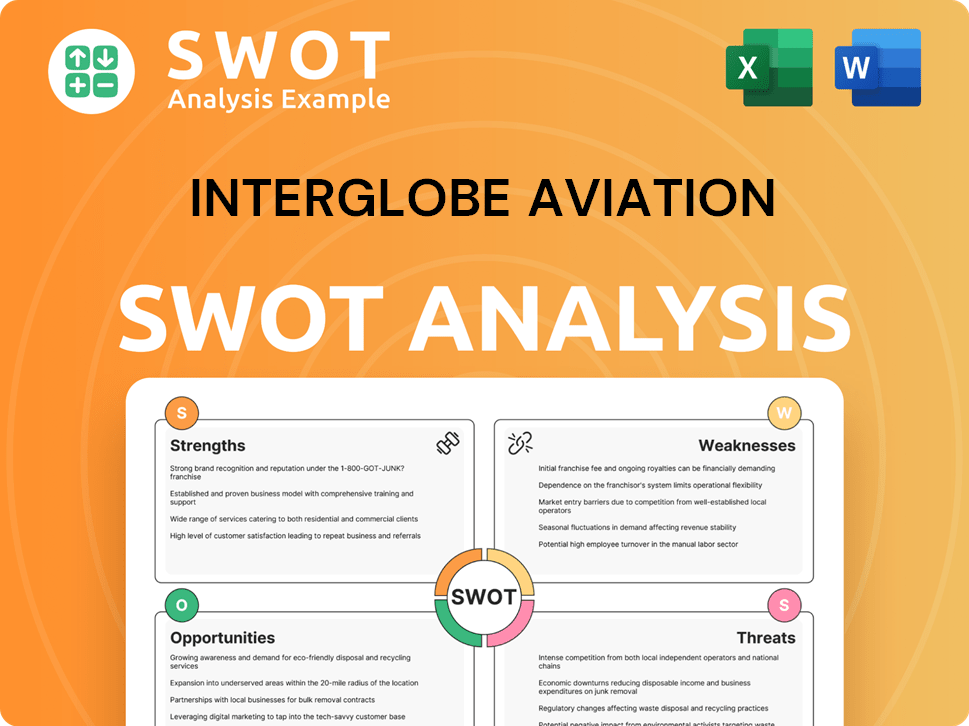
What Marketing Tactics Does InterGlobe Aviation Use?
The marketing tactics employed by InterGlobe Aviation, also known as IndiGo, are primarily focused on digital channels to boost brand awareness, generate leads, and drive sales. Their strategy is data-driven, leveraging insights to personalize customer experiences and optimize marketing spend. This approach allows for targeted campaigns and efficient resource allocation within the competitive aviation industry.
IndiGo's marketing efforts are designed to reach a broad audience while also catering to specific demographics and travel preferences. The airline's focus on digital marketing is evident in its content creation, SEO efforts, and targeted advertising campaigns. They also utilize traditional media strategically, especially during peak travel seasons.
The airline's approach to customer engagement and retention is supported by robust analytics tools, enabling continuous optimization of marketing campaigns. This data-driven strategy helps IndiGo maintain its position in the aviation market.
IndiGo's digital marketing strategy is comprehensive, encompassing content marketing, SEO, and paid advertising. They use their blog and social media to provide travel inspiration and information. This helps to enhance their visibility in search results and target specific demographics.
Content marketing is a core component, with the airline providing travel-related content through its blog and social media channels. SEO is crucial for ensuring high rankings in search results for relevant travel queries. This helps drive organic traffic to their website.
Paid advertising on search engines (Google Ads) and social media platforms (Facebook, Instagram, X) is a significant part of their strategy. They target specific demographics and travel intentions with tailored ad creatives. This helps to reach a wider audience.
Email marketing is used extensively for customer retention and engagement. This includes promotional offers, flight status updates, and personalized recommendations. It is a key tool for maintaining customer relationships.
While digital channels are prioritized, IndiGo still uses traditional media like TV and print advertisements. This is particularly evident during peak travel seasons or for new route launches. This helps to reach a broader audience.
IndiGo uses customer segmentation to personalize offers and communications. They analyze booking patterns, travel preferences, and demographic data. This is supported by analytics tools for tracking website traffic and campaign performance.
The airline's sales strategy and marketing strategy are closely aligned, focusing on data-driven insights to optimize customer acquisition and retention. For example, they use real-time data to offer dynamic pricing and personalized upsells for ancillary services, enhancing revenue generation. This data-driven approach is crucial for success in the competitive aviation industry. For a deeper dive into the financial performance and strategic initiatives of InterGlobe Aviation, you can refer to this article on the company's financial strategies.
IndiGo's marketing mix prioritizes cost-effective digital channels while maintaining a strategic presence in traditional media for broader brand awareness. This approach allows them to target specific customer segments and optimize marketing spend.
- Digital Marketing: Emphasis on content marketing, SEO, and paid advertising across various platforms.
- Email Marketing: Used for customer retention, promotional offers, and personalized recommendations.
- Traditional Media: TV and print ads, particularly during peak travel seasons or for new route launches.
- Data Analytics: Customer segmentation and analytics tools to personalize offers and optimize campaign performance.
- Dynamic Pricing: Leveraging real-time data for dynamic pricing and personalized upsells.
InterGlobe Aviation PESTLE Analysis
- Covers All 6 PESTLE Categories
- No Research Needed – Save Hours of Work
- Built by Experts, Trusted by Consultants
- Instant Download, Ready to Use
- 100% Editable, Fully Customizable
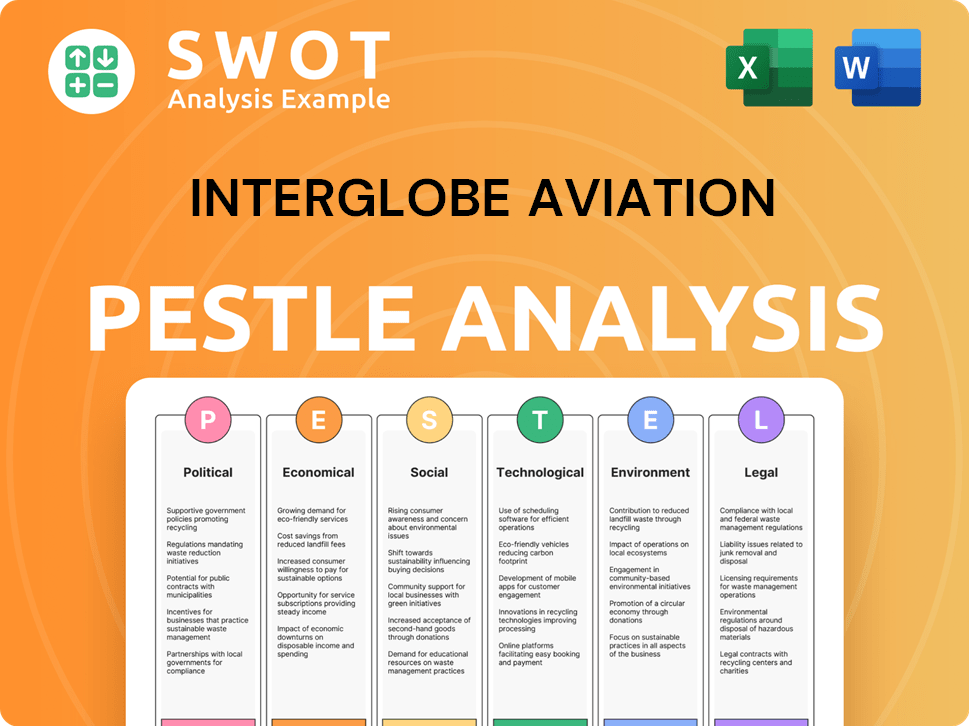
How Is InterGlobe Aviation Positioned in the Market?
IndiGo's brand positioning is centered around the promise of 'on-time, hassle-free, and affordable' air travel. This core message is consistently communicated across all touchpoints, from booking to arrival. The airline differentiates itself by focusing on operational efficiency and punctuality, crucial factors for Indian travelers. This strategy has allowed InterGlobe Aviation to build a strong reputation within the aviation industry.
The visual identity of the airline, characterized by its distinctive blue and white livery, reinforces its straightforward approach. The tone of voice is professional and customer-centric, emphasizing clarity and transparency. This consistency helps to build trust and brand recognition, making it a preferred choice for a wide range of travelers. The airline's success is also reflected in its strong financial performance, which is a key indicator of its effective sales and marketing strategy.
The customer experience is designed to be efficient and predictable, which is a key element in its marketing strategy. IndiGo's focus on operational excellence and customer satisfaction has led to high passenger satisfaction ratings. The airline's commitment to punctuality and reliability has positioned it as a leader in the aviation industry.
IndiGo primarily targets a broad audience that values affordability and reliability. This includes business travelers, leisure travelers, and those who prioritize value over luxury. The airline's focus on efficiency and low fares makes it accessible to a wider economic spectrum in India, driving its sales strategy.
The USP revolves around delivering a consistent, on-time product at a competitive price point. This value proposition is a cornerstone of its marketing strategy. This approach has enabled the airline to capture a significant market share and maintain strong customer loyalty. The airline's sales performance is a direct result of its effective USP.
While specific brand perception data from 2024-2025 is not readily available, IndiGo consistently ranks high in passenger surveys for punctuality and operational efficiency. This positive perception is crucial for maintaining its competitive edge in the aviation industry. The airline's marketing campaigns consistently reinforce these strengths.
IndiGo maintains strong brand consistency across all channels, from its website and mobile app to airport interactions and in-flight service. This consistency reinforces its core brand promise and builds trust. This integrated approach to marketing is key to its success.
In response to evolving consumer values, IndiGo is highlighting its efforts in fuel efficiency and fleet modernization. This aligns the brand with sustainability trends while maintaining its low-cost model. This proactive approach is a key element of its marketing strategy.
IndiGo leverages digital platforms extensively for marketing and sales. This includes targeted advertising, social media engagement, and a user-friendly website and app. The airline's digital marketing strategy is designed to reach a wide audience and drive bookings. This is a crucial part of the airline's sales strategy.
The airline focuses on providing a seamless customer experience from booking to arrival. This includes efficient check-in processes, comfortable seating, and on-time performance. The positive customer experience is a key driver of repeat business and brand loyalty. This is a critical component of the airline's marketing strategy.
IndiGo continuously analyzes market trends and customer preferences to refine its sales and marketing strategies. This includes monitoring competitor activities and adjusting its offerings to meet changing demands. This data-driven approach is essential for maintaining a competitive advantage. The airline's marketing campaigns are often informed by this market analysis.
The airline employs various revenue generation strategies, including ancillary services and partnerships. These strategies help to maximize revenue per passenger and improve profitability. These efforts contribute significantly to InterGlobe Aviation's overall financial performance. The airline's sales performance is enhanced by these initiatives.
The aviation industry faces challenges such as fuel price fluctuations and intense competition. IndiGo addresses these challenges through efficient operations and strategic marketing. Effective sales strategies are essential for navigating these challenges. The airline's marketing campaigns are designed to overcome these hurdles.
InterGlobe Aviation Business Model Canvas
- Complete 9-Block Business Model Canvas
- Effortlessly Communicate Your Business Strategy
- Investor-Ready BMC Format
- 100% Editable and Customizable
- Clear and Structured Layout
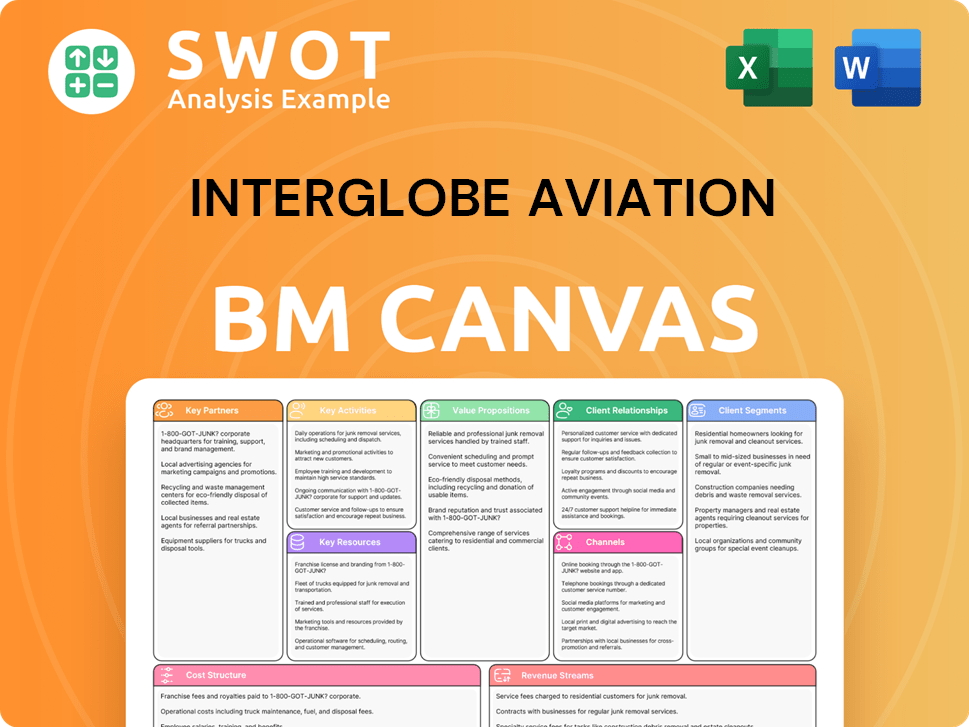
What Are InterGlobe Aviation’s Most Notable Campaigns?
The Competitors Landscape of InterGlobe Aviation showcases its prominent sales and marketing strategies, crucial for its success in the competitive aviation industry. These strategies have been pivotal in establishing and maintaining its market leadership. The company's campaigns are designed to resonate with a broad audience, emphasizing value, reliability, and convenience.
One of the key aspects of InterGlobe Aviation's marketing strategy is its consistent focus on on-time performance, which has become a cornerstone of its brand identity. This commitment is reinforced through various marketing materials and operational excellence. Their marketing campaigns are strategically designed to enhance brand recognition and drive sales.
As the aviation industry evolves, InterGlobe Aviation continuously adapts its marketing efforts to meet new challenges and opportunities. They leverage digital platforms and partnerships to reach a wider audience and strengthen their market position. The following sections will delve into some of the most impactful campaigns.
This campaign is not a single event but a sustained effort to highlight reliability. Its objective is to build trust and differentiate the brand in a market often plagued by delays. The creative concept emphasizes punctuality, using direct visuals and messaging across various channels.
These campaigns focus on new destinations, particularly in Southeast Asia and the Middle East. They emphasize affordability and convenience for international travel. Digital advertising, social media, and influencer collaborations are used to showcase the ease of travel.
Subtle campaigns highlight the modern fleet and efficient operations. This indirectly serves to reassure passengers about safety and comfort. This approach leverages operational excellence to enhance the brand's image.
These campaigns utilize digital platforms and social media to target specific demographics. They focus on driving bookings and engaging with potential customers. Data-driven strategies are implemented to optimize campaign performance.
The effectiveness of these campaigns is reflected in the airline's continued expansion and market share growth. In Q3 FY24, the company reported a passenger load factor of approximately 86.5%, indicating strong demand. The focus on on-time performance has consistently set InterGlobe Aviation apart. The airline's digital marketing strategy, including social media campaigns and targeted advertising, has been instrumental in customer acquisition and brand building. The company's revenue from operations for FY24 was reported at approximately ₹34,780.7 crore, reflecting the impact of effective sales and marketing strategies.
- On-Time Performance: Continuous messaging and operational focus.
- International Expansion: Campaigns for new routes in Southeast Asia and the Middle East.
- Digital Marketing: Targeted advertising and social media engagement.
- Fleet and Operations: Highlighting modern fleet and efficient operations.
InterGlobe Aviation Porter's Five Forces Analysis
- Covers All 5 Competitive Forces in Detail
- Structured for Consultants, Students, and Founders
- 100% Editable in Microsoft Word & Excel
- Instant Digital Download – Use Immediately
- Compatible with Mac & PC – Fully Unlocked
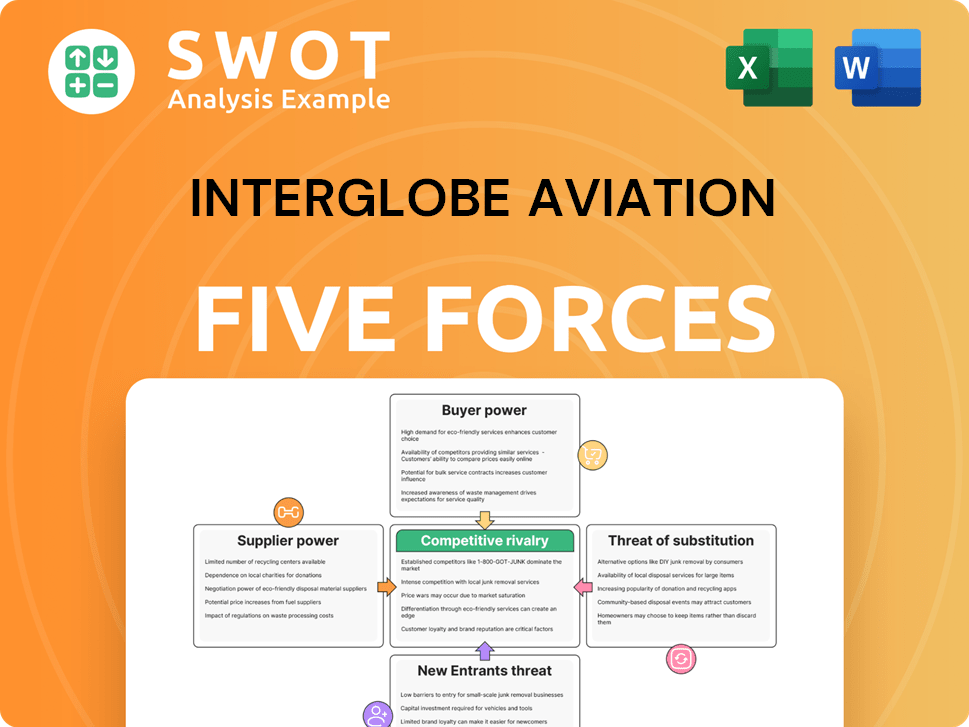
Related Blogs
- What are Mission Vision & Core Values of InterGlobe Aviation Company?
- What is Competitive Landscape of InterGlobe Aviation Company?
- What is Growth Strategy and Future Prospects of InterGlobe Aviation Company?
- How Does InterGlobe Aviation Company Work?
- What is Brief History of InterGlobe Aviation Company?
- Who Owns InterGlobe Aviation Company?
- What is Customer Demographics and Target Market of InterGlobe Aviation Company?
Disclaimer
All information, articles, and product details provided on this website are for general informational and educational purposes only. We do not claim any ownership over, nor do we intend to infringe upon, any trademarks, copyrights, logos, brand names, or other intellectual property mentioned or depicted on this site. Such intellectual property remains the property of its respective owners, and any references here are made solely for identification or informational purposes, without implying any affiliation, endorsement, or partnership.
We make no representations or warranties, express or implied, regarding the accuracy, completeness, or suitability of any content or products presented. Nothing on this website should be construed as legal, tax, investment, financial, medical, or other professional advice. In addition, no part of this site—including articles or product references—constitutes a solicitation, recommendation, endorsement, advertisement, or offer to buy or sell any securities, franchises, or other financial instruments, particularly in jurisdictions where such activity would be unlawful.
All content is of a general nature and may not address the specific circumstances of any individual or entity. It is not a substitute for professional advice or services. Any actions you take based on the information provided here are strictly at your own risk. You accept full responsibility for any decisions or outcomes arising from your use of this website and agree to release us from any liability in connection with your use of, or reliance upon, the content or products found herein.